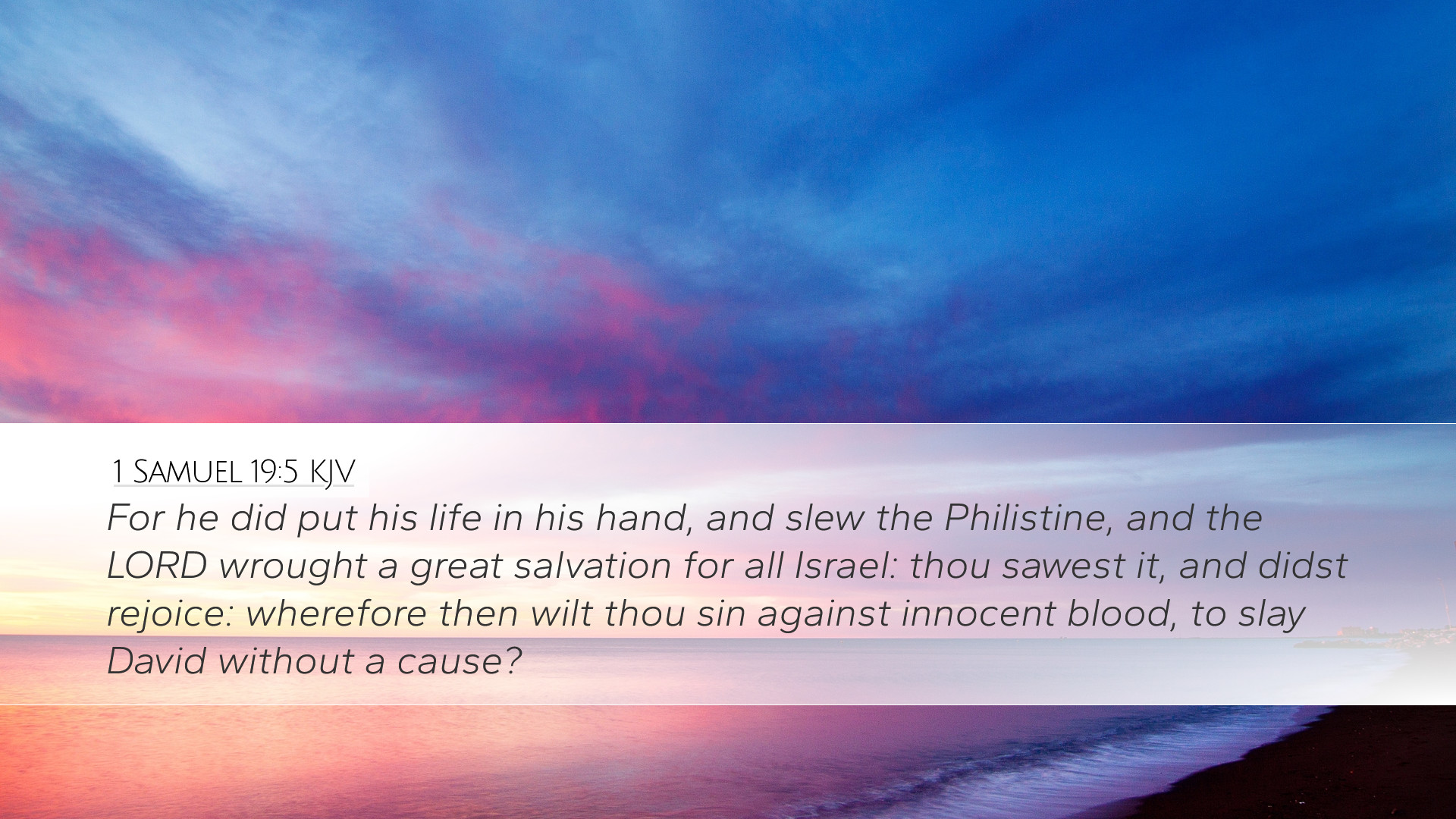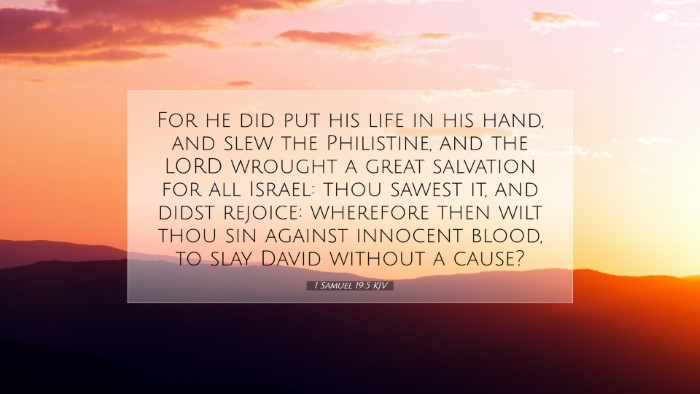Commentary on 1 Samuel 19:5
Bible Verse: 1 Samuel 19:5 (KJV) - "For he did put his life in his hand, and slew the Philistine, and the LORD wrought a great salvation for all Israel: thou sawest it, and didst rejoice: wherefore then wilt thou sin against innocent blood, to slay David without a cause?"
Contextual Overview
This verse occurs during a critical juncture in the narrative of David’s rise and the tragic decline of Saul's kingship. David, having gained fame and favor in Israel after his victory over Goliath, is now the subject of Saul's jealousy. As Saul's paranoia grows, David faces the impending threat of assassins. The moment captured in this verse showcases Jonathan, Saul's son, advocating for David's life based on his loyalty and the facts of David's past valor.
Theological Insights
-
Divine Intervention:
Matthew Henry emphasizes that David's success against Goliath was not merely due to his bravery but was attributed to the Lord's providential guidance. This event marked a turning point in Israel's fortunes, and Jonathan's appeal to Saul reflects an acknowledgment of God's hand in supporting David.
-
Human Fallibility:
Albert Barnes points out the tragic irony in Saul’s reaction. Despite witnessing God’s work through David, Saul’s envy blinds him to truth and righteousness. This represents the broader theme in Scripture, where leaders can become corrupt when they allow jealousy or fear to cloud their judgment.
-
The Weight of Innocence:
Adam Clarke remarks on the moral implications of Saul's intentions. Jonathan's plea emphasizes the innocence of David and points to the moral weight of shedding innocent blood. This plea is a significant moment in the biblical text that reflects the biblical value placed on life and innocence.
Character Analysis
-
David:
David is portrayed not just as a warrior but as a faithful servant to God. His act of slaying Goliath symbolizes the triumph of faith over does not solely rest on physical might, but rather on obedience and trust in divine help.
-
Saul:
Saul’s descent into jealousy illustrates the dangers of pride and insecurity in leadership. His initial recognition of David’s value is overshadowed by an obsessive need to eliminate what he perceives as a threat to his authority. Barnes highlights this as a classic example of how power corrupts.
-
Jonathan:
Jonathan stands as a model of loyalty and righteousness. He balances his loyalty to his father with his allegiance to David, showcasing the struggle between familial duties and moral truth. Henry notes Jonathan’s courageous defense of David illustrates the essence of true friendship.
Thematic Considerations
-
Good vs. Evil:
The conflict between David and Saul can be viewed as a macrocosm of the cosmic battle between good and evil. Saul’s actions contrast sharply with David’s faith and integrity. This theme resonates throughout scripture, particularly evident in the lives of many biblical figures who encounter resistance as they pursue righteousness.
-
The Role of Intercession:
Jonathan’s intercession for David illustrates the biblical principle of standing for the innocent and the vulnerable. It shows the power of one individual to influence another for good, reinforcing the idea of advocacy in the face of injustice.
-
Moral Responsibility:
This verse underscores the importance of moral responsibility. Saul is warned against committing an unjust act, and the reminder of the consequences of such acts serves as an admonition to all leaders to govern with integrity.
Pastoral Applications
-
Emphasizing Integrity:
Pastors can draw from this narrative when teaching on the importance of integrity and the consequences of jealousy and sin. The character of Jonathan serves as an example for congregations to engage in intercessory prayer and support those who may be unjustly persecuted.
-
The Call to Courage:
This verse challenges leaders to have the courage to stand for the innocent, keeping in mind that societal pressures and personal insecurities can lead one astray. It is a reminder that faith requires action and that true leadership often involves taking risks for the sake of justice.
-
Reflection on God’s Sovereignty:
Encouragement for believers to trust in God’s sovereignty, as seen in the narrative of David, can empower church members facing their own trials. Just as David's life was in God's hands, so too are our lives subject to divine purpose and direction.
Conclusion
The message of 1 Samuel 19:5 resonates deeply through the voices of notable commentaries. It speaks into the human condition, addressing the themes of jealousy, righteousness, and the safeguarding of life. For pastors, students, and scholars alike, this passage serves as both a warning and an inspiration, encouraging rigorous self-examination and a steadfast commitment to justice.


